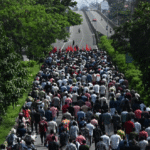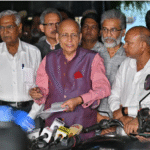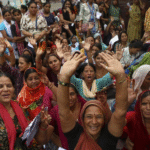1. Introduction: A Nation in Turmoil
Myanmar Military ongoing political and humanitarian crisis reached another grim milestone as a military air strike killed over 40 civilians and destroyed approximately 500 homes in Kyauk Ni Maw, a village in Yanbye township, Rakhine State. This tragic event, which occurred on a Wednesday afternoon, has drawn widespread international condemnation. The attack was confirmed by Myanmar’s opposition government, the National Unity Government (NUG), and the United Nations (UN), highlighting the escalating brutality of the junta’s actions.
In this article, we delve deeper into the circumstances surrounding this attack, Myanmar Military the historical context of Myanmar’s conflict, and its far-reaching humanitarian implications.
2. The Myanmar Military Attack on Kyauk Ni Maw Village: A Heinous Act
Reports from the UN and the NUG detail a devastating air strike carried out by Myanmar’s ruling military junta on Kyauk Ni Maw, a peaceful coastal village in Rakhine State. Residents recall a terrifying scene as military jets bombarded the area without warning, leveling homes and causing countless casualties.
Preliminary estimates suggest more than 40 deaths, including women and children, Myanmar Military with dozens more injured or missing. Survivors described scenes of chaos, with homes reduced to rubble and plumes of smoke covering the village. “We heard the jets overhead, and within seconds, everything was gone,” said one survivor.
The assault was reportedly part of a broader military campaign against ethnic Rakhine insurgents; however, civilians bore the brunt of the attack.
3. The Historical Context of Myanmar’s Conflict
Myanmar has been embroiled in political turmoil since February 2021, Myanmar Military when the military overthrew the democratically elected government of Aung San Suu Kyi in a coup. The junta’s seizure of power sparked widespread protests and an armed resistance movement led by ethnic groups and the NUG.
Rakhine State, long a hotspot for ethnic tensions, has suffered significantly due to military operations. In addition to its history with the Rohingya Muslim population—many of whom were forced to flee to Bangladesh in a mass exodus beginning in 2017—the region has also been a battleground for clashes between the Arakan Army (an ethnic Rakhine insurgent group) and the junta.
This latest air strike underscores the junta’s indiscriminate use of force against both insurgents and civilians, amplifying fears of war crimes and crimes against humanity.  for more information click on this link
for more information click on this link
4. International Outrage and Condemnation
The United Nations, human rights organizations, and global leaders have condemned the attack, Myanmar Military labeling it a blatant disregard for civilian safety. A statement released by the UN denounced the junta’s continued use of air strikes as “unacceptable and barbaric,” calling for immediate action to protect Myanmar’s civilian population.
Tom Andrews, the UN Special Rapporteur on human rights in Myanmar, Myanmar Military characterized the attack as part of a broader campaign of terror being waged by the junta. “This atrocity demonstrates the lengths to which the military is willing to go to maintain its grip on power,” Andrews stated.
The attack also prompted calls for an international arms embargo against Myanmar and strengthened demands for accountability at the International Criminal Court (ICC).
5. A Humanitarian Crisis Escalates
The assault on Kyauk Ni Maw comes amidst a growing humanitarian crisis in Myanmar, where millions have been displaced, and access to basic resources remains scarce. According to UN estimates, Myanmar Military over 1.5 million people are internally displaced, with Rakhine State among the hardest-hit regions.
Survivors of the attack face immediate challenges, including lack of shelter, food, and medical care. With 500 homes destroyed, hundreds of families are now left homeless, many seeking refuge in makeshift camps or neighboring villages. Relief efforts have been hampered by the junta’s restrictions on humanitarian access to affected regions.
6. The National Unity Government’s Response
The National Unity Government (NUG), Myanmar’s shadow government, has condemned the air strike as a war crime and vowed to seek justice for the victims. In a statement, the NUG declared that the attack “exposes the true nature of the military junta” and urged the international community to intervene.
The NUG has also called for greater support for Myanmar’s resistance movement, Myanmar Military advocating for recognition and resources to counteract the junta’s violent tactics.
7. The Role of the Global Community: What Needs to Be Done
The international response to Myanmar’s crisis has been widely criticized as inadequate. While sanctions have been imposed on senior military officials and companies linked to the junta, Myanmar Military these measures have done little to deter further violence.
Experts argue that more decisive actions are needed, including:
- A coordinated global arms embargo: Preventing the military from acquiring weapons and resources to fuel its campaign.
- Humanitarian corridors: Facilitating the delivery of aid to conflict zones, bypassing junta-imposed restrictions.
- ICC investigations: Holding Myanmar’s military accountable for war crimes and ensuring justice for victims.
Regional organizations like ASEAN have also faced scrutiny for their inability to broker peace. Although the bloc adopted a five-point consensus in 2021 to address Myanmar’s crisis, Myanmar Military progress has been slow, and the junta’s non-compliance has eroded faith in the initiative.
8. Voices from the Ground: The Human Cost of War
Interviews with survivors paint a harrowing picture of life under the junta’s oppressive rule. One resident of Kyauk Ni Maw, now sheltering in a neighboring town, Myanmar Military described the heart-wrenching loss of family and community. “I lost my mother, my home, and everything I worked for,” they said through tears.
Children, too, are deeply affected. Many have been orphaned by the attack, Myanmar Military while others bear physical and emotional scars that will take years to heal. Human rights advocates stress the urgent need for psychosocial support for survivors, particularly children.
9. Beyond Kyauk Ni Maw: A Pattern of Violence
The air strike on Kyauk Ni Maw is not an isolated incident. Since the coup, Myanmar’s military has increasingly relied on air power to suppress resistance, targeting civilian areas under the pretext of eliminating insurgents. In one of the deadliest attacks earlier this year, over 100 people were killed during an air strike on a village in Sagaing Region.
Human rights organizations have documented a pattern of violations, Myanmar Military including arbitrary detentions, torture, and extrajudicial killings. The scale of violence suggests a deliberate strategy to instill fear and crush dissent.  for more information click on this link
for more information click on this link
10. The Path Forward: Hope Amidst Tragedy
Despite the immense challenges, there remains hope for Myanmar. Activists, grassroots organizations, and resistance groups continue to fight for a democratic and inclusive future. The bravery of ordinary citizens, combined with international solidarity, could pave the way for meaningful change.
Moreover, Malala Yousafzai, the Nobel Peace Prize laureate, Myanmar Military and global advocacy groups have amplified calls for educational and humanitarian support for affected children and communities. Initiatives like these offer a glimmer of hope amidst the darkness.
11. Conclusion: A Tragedy That Demands Accountability
The air strike on Kyauk Ni Maw is a stark reminder of the junta’s disregard for human life and the dire need for international intervention. As the world watches, Myanmar’s people continue to endure unimaginable suffering.
This tragedy must serve as a wake-up call to the global community. The lives lost in Kyauk Ni Maw cannot be in vain—they must spur collective action to end Myanmar’s crisis, Myanmar Military hold its perpetrators accountable, and ensure a future free from violence and fear.
For the people of Myanmar, the journey to peace and justice may be long, but with unwavering determination and global support, a brighter future is possible. ALSO READ:- Nobel Laureate Malala Yousafzai ‘Overwhelmed and Happy’ to Be Back in Pakistan 2025





